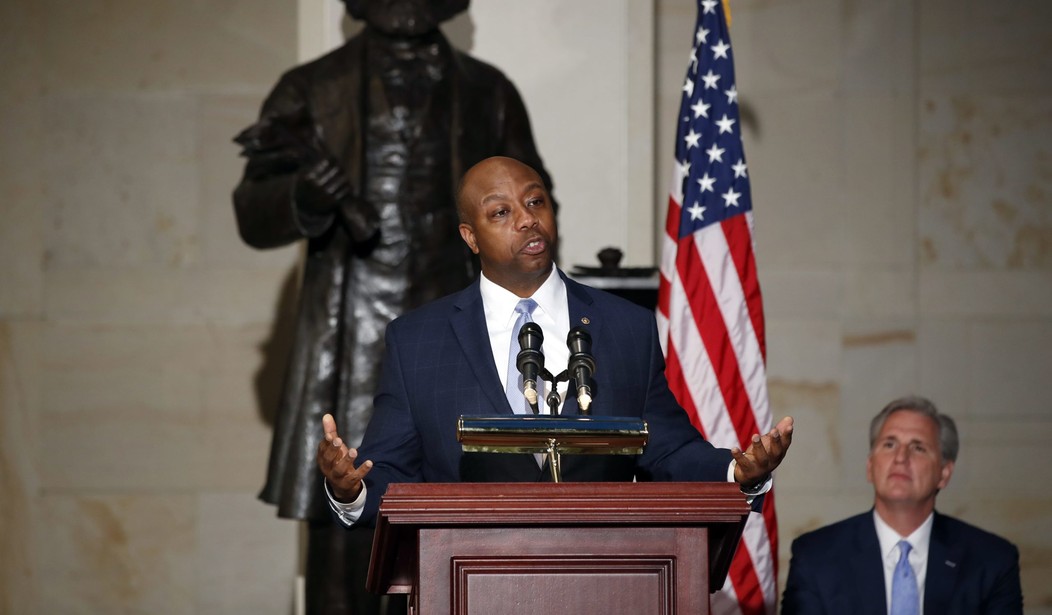WASHINGTON – Sen. Tim Scott (R-S.C.) said there is “no faster way” to lower the unemployment rate in minority communities than to ensure greater access to capital for businesses, which helps increase the number of entrepreneurs in local communities and creates new jobs.
“The importance of making sure we connect entrepreneurship with our HBCUs cannot be overstated. When you look at the unemployment rates in our country, especially in communities of color, it is oftentimes twice that of the average unemployment in the nation. One of the reasons why – if you look at the root system of unemployment – it has a lot to do with the number of entrepreneurs in your neighborhood. When you grow up in neighborhoods where there are no entrepreneurs, the unemployment rate will always be consistently higher than those neighborhoods that have entrepreneurs,” Scott said at a recent conference with Historically Black Colleges and Universities on Capitol Hill.
“My life was changed financially when I became an entrepreneur. I had the 1996 minority businessman of the year, Al Jenkins, who decided to take a second look at my business plan because all the banks said no. He said yes, so I was able to start a business. And from my business that I started, which was an Allstate franchise, now two of my former office managers, who are both African-American females, are now running their own Allstate franchises – one in Florida, Jacksonville, the other in Summerville, South Carolina,” he added.
Scott said HBCUs “start creating the antidote to the high and persistent unemployment rate in our communities” when the “entrepreneurial spirit” is alive on campus and students are “interfacing” with the business community.
“There is no faster way to drive that down than making sure we have more entrepreneurs present in those communities where the unemployment rate is the highest,” he said.
PJM asked Scott for his recommendations on ways the federal government should assist local entrepreneurs, franchise owners and small businesses.
“There’s a regulatory burden. There’s a tax burden, but we’ve scaled back on both of those. I think we’ve had a very successful year on scaling back a couple of the hurdles but the ones that remain – access to capital is perhaps the largest one,” Scott said. “If you’ve got the talent, the wage will take care of itself. And if you have the market – if you don’t have the market and the talent, none of it works together.”
Rep. Mark Walker (R-N.C.), chairman of the Republican Study Committee, encouraged members of Congress to reach out to their local elected officials and work together to foster a welcoming environment for new local business owners and HBCU graduates.
“We need you to win, we’re pulling for you,” Walker said to the HBCU presidents in the room.
Rep. James Lankford (R-Okla.) emphasized the importance of mentorship programs at HBCUs where students can seek advice from working professionals in their field of study such as engineering.
“It’s a different thing to actually be in the classroom developing relationships with certain professors and getting the chance to be around folks, not just attending a football game or not just attending an event and knowing they are around but having the opportunity for students to be able to meet them and go, ‘What do you do? And how does that work?’” Lankford said. “As much as you can engage in that, do it.”
Lankford told the HBCU presidents to be specific about regulations that they would like to see changed or eliminated when they face regulatory barriers or compliance issues.
“I need to know what is the regulation, which one is the problem, so as specific as you can be when you come or when you call on us and to say, ‘this is an issue for us,’” he said. “As shocking as it may seem, I know this is shocking, members of Congress are not omniscient – shocking. You live and breathe all those details. We hear about it only when you tell us.”
Rep. Terri Sewell (D-Ala.) said helping HBCUs is a bipartisan issue on Capitol Hill.
“It’s important that you sit down with your members of Congress and your senators and really talk about not only what government can do better, but what government has done well in helping you because I think we need some success stories that will help us when we are in those committee rooms fighting for more resources,” she said. “It’s a give-and-take, so I hope you will use this opportunity to tell us, yes, what your needs are, but also what’s worked.”









Join the conversation as a VIP Member